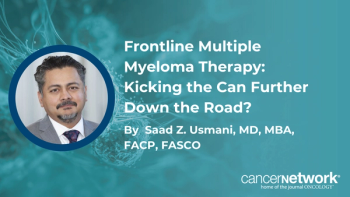
Kevin Kalinsky, MD, MS, on Exciting Breast Cancer Treatments Coming Down the Pike
“We’re hearing about other antibody-drug conjugates, other agents in hormone receptor–positive metastatic disease, and the next generation of drugs that we’ll be using to treat our patients.”
With an abundance of data presented at the 2020 San Antonio Breast Cancer Symposium, there is a lot to look forward to in the breast cancer space moving forward, according to Kevin Kalinsky, MD, MS.
Kalinsky, acting associate professor in the Department of Hematology and Medical Oncology at Emory University School of Medicine as well as director of both the Glenn Family Breast Center and of breast medical oncology at Winship Cancer Institute of Emory University, spoke with CancerNetwork® about the exciting drugs coming down the pike in breast cancer treatment.
Transcription:
I think that we are seeing increasing data about the role of CDK4/6 inhibitors in the operable setting and also in the metastatic setting…The other thing that I’m keen on is just the novel therapies that are coming down the pike. We’ll get some additional information about some approved drugs like trastuzumab [Herceptin], for instance, in patients with breast cancer. I think we’re also hearing about other antibody-drug conjugates, other agents in hormone receptor–positive metastatic disease, and the next generation of drugs that we’ll be using to treat our patients. There’s a lot that’s coming down the pike.
Newsletter
Stay up to date on recent advances in the multidisciplinary approach to cancer.






































